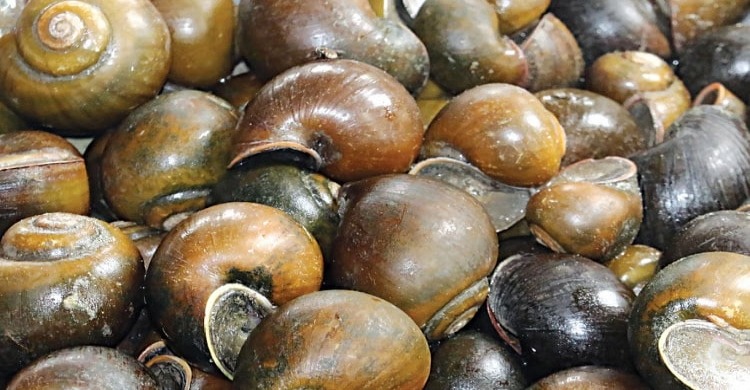Shells of survival: ethnic minority communities thrive on river harvest


Along the banks of the Chhoto Jamuna River in Dinajpur's Fulbari upazila, a quiet but industrious rhythm unfolds each day.
Men and women from ethnic minority communities wade into the water, diving or searching with outstretched arms not for fish, but for freshwater mollusks. These humble snails and mussels have become a lifeline, sustaining families and fueling a cottage industry that blends tradition, survival, and sustainability.
Families from the ethnic minority communities of Surjopara village in Aladipur union rely on collecting snails and mussels from the Chhoto Jamuna River for their livelihood.
A visit to the riverbank on Friday revealed groups of men and women immersed in the water, some diving, others searching with their hands, gathering mussels and storing them in pouches tied around their waists.
This scene is common along both banks of the river as it flows through Khairbari union. Locals said that mussel collection from the river yields a good income.
Every day, groups from the ethnic Santal community venture into the river to collect snails and mussels.
One such collector, Robin Kisku, a 40-year-old Santal man, explained, "After collecting mussels, I store them in a damp place near my house. They stay fresh for up to a week."
"We cook and eat the soft inner part, while the shells are sold to lime producers at Taka 10 per kg. This helps meet our food needs and provides a decent income," he said, adding, "I collect 70 to 80 kg of mussels daily, earning Taka 700 to Taka 800."
Women from the community are equally engaged. Merina Tudu, 32, from Khairbari union, said, "We all collect mussels together. They provide food, and we sell the shells to traders. It's a good source of income."
Others like Romela Hasda, Aruna Hemrom, and Sakhi Murmu echoed her sentiments. They noted that during the three dry months of the year, mussel collection is easier, while the monsoon season poses challenges. Still, daily earnings range from Taka 600 to Taka 700.
While visiting the areas, locals revealed that traders from Birampur and Dinajpur Sadar upazilas have long been purchasing snails and mussels to produce lime using traditional methods. Many families have funded their children's education through this trade.
Noren Chandra Roy, a lime trader from Kashipur Chuniyapara in Dinajpur Sadar said, "We buy mussels at Taka 350 per maund and produce lime for sale. Lime made from snails and mussels is safe for consumption with betel leaf. People have used it for generations."
He added that lime made from stone, now common in markets, can harm health. Many betel leaf consumers ask vendors whether the lime is made from stone or mollusk shells, often avoiding stone-based lime.
Local traders claimed that the BSTI Dinajpur division tested stone-based lime and found it unsuitable for consumption with betel leaf. However, lime made from snails and mussels contained no harmful substances, and BSTI approved its marketing.
Mohan Chandra Roy, a lime producer from Chuniyapara, said, 'Fifteen families in our village produce lime from snail and mussel shells. We buy shells wholesale from ethnic collectors and burn them into ash through a special process to produce lime.'
He added, 'Our lime contains no added chemicals, and BSTI has approved it as safe.'
Highlighting the ecological role of mollusks, Fulbari Upazila Fisheries Officer Rasheda Begum said, 'Snails and mussels help maintain environmental balance by consuming waste and purifying water. They are nature's filters.'
She said wildlife protection laws prohibit harvesting mollusks from natural sources. However, ethnic minority communities are allowed to collect them for food. Mollusks grow abundantly in the Chhoto Jamuna River, unlike in many other rivers.
Despite extensive harvesting, their numbers remain stable due to natural regeneration. Therefore, no restrictions are imposed on indigenous collectors, she added.
Rasheda Begum affirmed that harvesting by the communities actually contributes to the growth of mollusk populations in the river.
